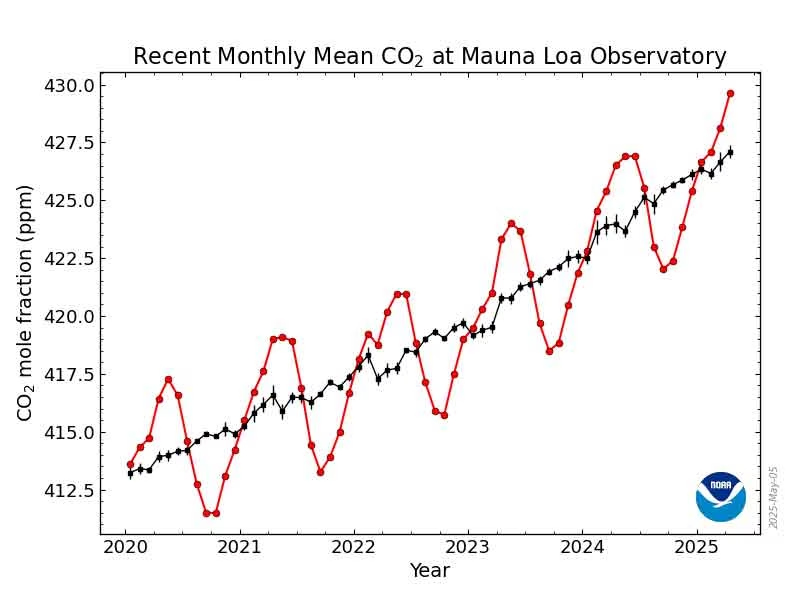
Capitalism, like Antarctica and like the Amazon rainforest, is under threat of destruction by excessive levels of CO2 emissions which cause radical climate change. Risk of some level of extinction of capitalism goes to the heart of a recent article written by Gunther Thallinger, Member of the Board of Management of Allianz Group (est. 1889, Munich) the world’s largest insurance company: Climate, Risk, Insurance: The Future of Capitalism d/d March 25, 2025.
Mr. Thallinger’s provocative article starts by spelling out the relationship between CO2 emissions and “the amount of energy” trapped in the atmosphere, which is one way of saying “global warming trapped in the atmosphere,” as he draws a direct link between the two.
Mr. Thallinger spells out the risks: “These extreme weather phenomena drive direct physical risks to all categories of human-owned assets—land, houses, roads, power lines, railways, ports, and factories. Heat and water destroy capital. Flooded homes lose value. Overheated cities become uninhabitable. Entire asset classes are degrading in real time, which translates to loss of value, business interruption, and market devaluation on a systemic level.”
If this is how a board member of the world’s largest insurance company views risks to capitalism’s asset structure, then the world’s capitalist’s chieftains should seriously consider altering the destructive nature of climate change asap by omitting CO2 emissions.
Thallinger explains the risks to capitalism’s markets: “The insurance industry has historically managed these risks. But we are fast approaching temperature levels 1.5°C, 2°C, 3°C where insurers will no longer be able to offer coverage for many of these risks. The math breaks down: the premiums required exceed what people or companies can pay. This is already happening. Entire regions are becoming uninsurable.”
Risks of Climate-induced Credit Crunch
Accordingly, “This is not a one-off market adjustment. This is a systemic risk that threatens the very foundation of the financial sector. If insurance is no longer available, other financial services become unavailable too. A house that cannot be insured cannot be mortgaged. No bank will issue loans for uninsurable property. Credit markets freeze.”
Thallinger goes on to explain how excessive climate change damages capitalism to “climate-driven market failure.” Nothing could be a weirder coincidence than capitalism self-destroying via the genesis of industrialization powered by oil.
Solutions to climate change are difficult beyond halting fossil fuel emissions, full stop. For instance, state support where insurance fails to cover damage is not a realistic option as multiple climate-related disasters strain public budgets beyond acceptance by taxpayers. Consequently, multiple climate disasters ultimately lead to either governmental austerity or collapse. There is no in-between and neither option is satisfactory for a vibrant capitalistic economy.
As for adaptation to climate change, Thallinger does not see any easy ways out, claiming “the false comfort of adaptation” as one more downside to the global warming complexity. “There is no way to ‘adapt’ to temperatures beyond human tolerance.” And adaptation, by definition, is limited with mega fires and cities built on flood plains. There are no easy answers.
By implication, Thallinger assumes 3°C of warming is on deck as he states the situation is “locked in once 3°C is reached,” admitting there is no turning back due to carbon cycle inertia and absence of scalable industrial carbon removal technologies. “At that point, risk cannot be transferred (no insurance), risk cannot be absorbed (no public capacity), and risk cannot be adapted to (physical limits exceeded). That means no more mortgages, no new real estate development, no long-term investment, no financial stability. The financial sector as we know it ceases to function. And with it, capitalism as we know it ceases to be viable.”
In conclusion, Thallinger says we must burn less carbon and/or capture it at the point of combustion. Meanwhile, the technology to switch out of fossil fuels is extant, solar, wind, battery storage, green hydrogen are scalable solutions. What’s missing is “speed and operating scale.” Although, some scientists believe ‘time is fast running out,” maybe too fast.
Subscribe to Our Newsletter
Get the latest CounterCurrents updates delivered straight to your inbox.
However, Thallinger does not mention the biggest impediment to solving the climate change imbroglio, politics. The U.S., normally the world leader for global scale issues, has bowed out of the fixit climate change race. The U.S. is promoting more CO2 emissions via increased oil & gas drilling and additional coal production in addition to dramatically downsizing the EPA and NOAA, which are key agencies to solving the climate change imbroglio all of which is the opposite of what Thallinger recommends to save capitalism.
Robert Hunziker is a journalist from Los Angeles













































